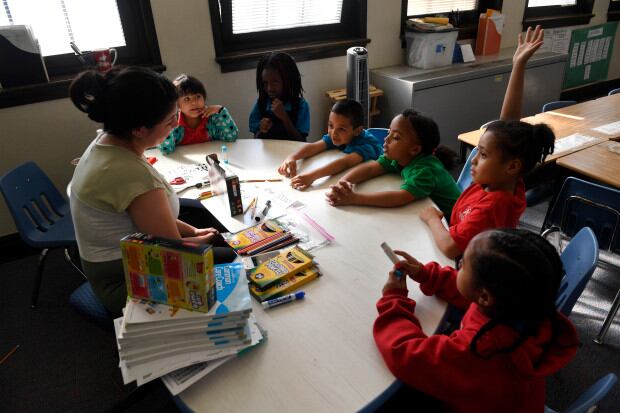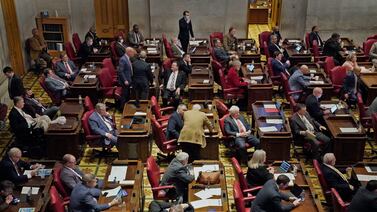The Denver school board unanimously approved a budget Monday that cuts $65 million while still giving raises to teachers and low-wage workers. Top district administrators will see their salaries reduced, with the superintendent taking a 10% pay cut.
School districts across Colorado are having to slash their budgets for next school year. Schools get significant funding from local property taxes, as well as state income and sales tax revenue, which has plummeted because of the coronavirus pandemic. As a result, state lawmakers cut by 5% the amount of per-student funding Colorado will send to districts next year.
Denver Public Schools, the state’s largest district with 92,000 students, had to cut its $1.1 billion budget by more than 5%. The cuts avoid layoffs and do not impact individual school budgets — key goals identified by both board and community members.
The biggest reduction — $18 million — comes from the district’s central office, which has long been criticized as top-heavy, even after a round of cuts last year.
But the size of the central office won’t shrink, according to a budget presentation; rather, the savings will come from canceling third-party contracts, adjusting school bell times so buses run more efficiently, delaying curriculum purchases, and other shifts.
Another $4.8 million in savings will come from shrinking some raises received by teachers, nurses, and others who belong to the Denver teachers union.
Teachers were guaranteed a 1.9% cost-of-living raise per a hard-won contract signed after a strike last year. But in a compromise with the district, the union agreed earlier this month to a 0.5% cost-of-living raise instead. That raise will be in addition to pay increases teachers can earn for longevity and training. Denver teachers make an average salary of $65,000.
The district is currently negotiating with the unions that represent workers making less than $25 an hour, including bus drivers and teachers’ aides. If the unions agree to the district’s proposal, Denver would save another $3.7 million through what it calls “progressive pay adjustments.”
Low-wage workers would get pay raises, while higher-wage workers would see their salaries reduced through a combination of pay cuts and unpaid furlough days.
The superintendent has committed to taking the biggest pay cut, at 10%. She currently makes $260,000 a year. Deputy superintendents would take a 5% pay cut, while other administrators who make more than $100,000 a year would take cuts of anywhere from 0.75% to 2.5%.
School principal salaries would stay flat. Principals make an average of $120,000 per year.
Under the district’s proposal, employees who make between $20 and $25 an hour, including bus drivers, would get a 0.5% pay increase. Employees who make between $15 and $20 an hour, such as custodians and teachers’ aides, would get a 1% pay increase. And employees who make less than $15 an hour, such as food service workers, would get a 1.9% raise.
Colorado school districts have until January to amend their current year budgets.
To help fill next year’s budget gap, the district will also use $10 million in federal coronavirus relief aid. That money can only be used on expenses related to COVID-19, such as training for teachers on remote learning, hiring more nurses and counselors to address students’ increased physical and mental health needs, and buying supplies such as face masks.
Altogether, those adjustments make up for about $37 million of the $65 million shortfall. The remaining $28 million gap will be filled, at least in part, by spending down the district’s budget reserves. The district has about $100 million in reserves.
If the school board decides to ask Denver voters in November to raise additional tax dollars for schools, and if Denver voters agree, the district would not have to dip into its reserves as deeply. Denver voters have in the past approved tax increases for schools, but the current economic downtown makes passage less certain this time around.








